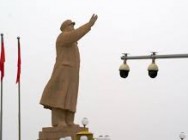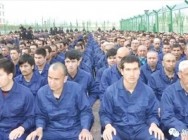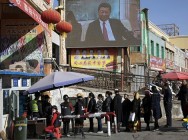Professor Graham Allison at Harvard University mooted a solution to the North Korea conflict in the New York Times on May 30. Allison starts by scaring us with a high likelihood of war, about 75%, in similar conflicts between a major power and a smaller rising power in history. That I believe. He implies a 33% chance that the North Korea crisis, like the Cuban missile crisis, could spiral into a nuclear war. That I doubt.

A photo taken on May 21, 2017 shows an art installation featuring propaganda loudspeakers arranged to read: ‘Peace’, at the Peace dam, north of Hwacheon near the Demilitarized Zone (DMZ) separating North and South Korea. Contruction of the ‘Peace Dam’ was intermittent from 1987 to 2005, reportedly as a response to the threat of accidental or intentional flooding from the North Korea’s Imnam Dam which lies further up river, across the DMZ. North Korea on May 22 confirmed the ‘successful’ launch of a medium-range ballistic missile, Pyongyang’s state media reported, adding the weapon was now ready to be deployed for military action. Credit: ED JONES/AFP/Getty Images
After shocking us with the threat of catastrophic war, Allison uses that risk to justify his proposal to avert the crisis. Professor Allison states, in a manner that sounds like he has first-hand knowledge, that “some people in Mr. Xi’s circle” say the crisis could be solved by first, China removing the Kim regime, and unifying North and South Korea under a pro-Beijing Seoul, second, removing U.S. troops, and third, ending the U.S.-South Korea alliance. Like Xi reportedly provided to Trump, these “people in Mr. Xi’s circle” even give a historical justification to buttress the Chinese proposal for China’s administration and shaping of Korean unification. In the core of his argument, Allison says,
“Had North Korea not attacked the South in 1950, the United States would never have intervened. So if China were to assume responsibility for removing the Kim regime, denuclearizing the country, and reunifying the peninsula under a government in Seoul friendly to Beijing, would the United States remove all its bases from the South and end its military alliance?”
In other words, Allison appears to advise, or at least uncritically repeat Chinese advice, that China and North Korea are threatening us with nuclear war, so give in and give up South Korea. That advice is buttressed by an ostensible lack of U.S. historical presence on the peninsula. Allison’s proposal dovetails nicely with President Trump’s understanding after Xi’s history lesson, in which “Korea actually used to be a part of China.”
These questionable interpretations of history lead to Allison’s surprising proposal for what amounts to capitulation. It is revanchist appeasement on a grand scale. It is a realism ready to throw international law, democracy and human rights away for a fleeting moment of safety. That is not the America of Paul Revere and George Washington, who risked it all for liberty. And, what of other proposals, such as an election in North Korea, or economic sanctions against China until China forces the North to stop its nuclear weapons development? If China can remove the Kim regime and unify the peninsula, surely it can remove North Korea’s nuclear weapons? Surely tough economic sanctions against China would not result in nuclear war? These options are not mentioned by Allison, who focuses his opinion piece on fear and allied concessions.
China has taken slivers of territory in the Philippines, Vietnam and India, and since 1972 the U.S. has shown acquiescence, fear and a lack of resolve to defend that territory, and along with it democracy and international law. Given demonstrated U.S. fear, why shouldn’t China go for an entire nation like South Korea? In the process, did “some people in Mr. Xi’s circle” nudge a Harvard professor to write an opinion piece in the New York Times to soften up public opinion beforehand?
What I will call Allison’s proposal, because he is the first I know to make it publicly, lacks any mention of democracy and human rights in South Korea. And what of democracy and human rights in the North? Would Allison’s proposal mean that the North Korean police could, with support or as part of his “government in Seoul friendly to Beijing”, root out democratic opposition in the South? Does Allison really think that China would disassemble North Korea’s police state apparatus, which appears much more like Beijing’s government than does South Korea’s democracy? If China is really to make Seoul pro-Beijing, which appears to be a nondemocratic Chinese condition in Allison’s proposal, then one should expect Kim Jong-un’s regime to be transported to Seoul, with or without Kim Jong-un, rather than democracy transported to Pyongyang.



















